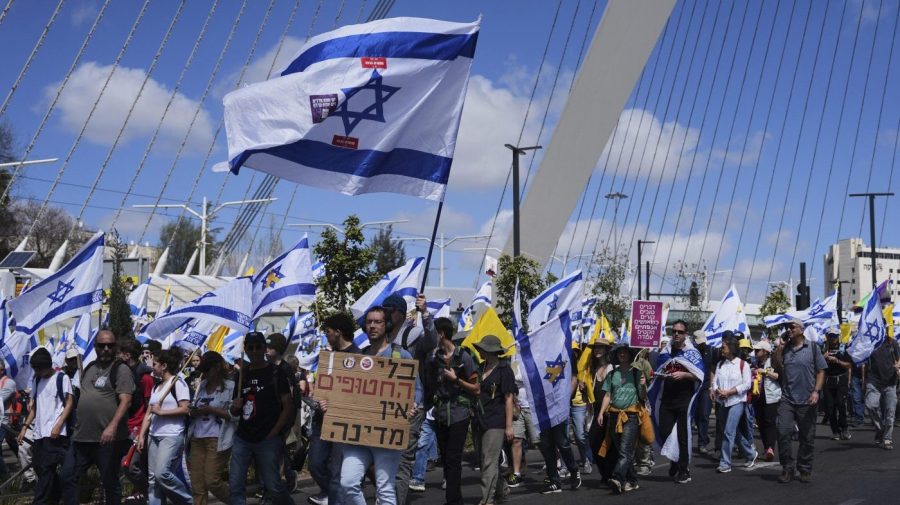
For years, Israelis could comfortably ignore “the Palestinian question.” Despite occasional terror attacks, cycles of rocket fire and the cost of militarily controlling millions of Palestinians, most Israelis could more or less disregard the underlying issues, certainly when living in the densely populated areas centered around Tel Aviv, or in other such bubbles.
The Oct. 7, 2023 Hamas-led massacre and its aftermath radically changed this. But a year and a half into the war, Israeli politics and society have not been able to come up with feasible and sufficiently widely endorsed alternatives for the “day after.”
This is not only bad news (again) for the Palestinians and the rest of the world. Israel’s inability to guarantee security for its own population and negotiate a sustainable solution for the millions of noncitizens under its rule has started to take a very serious toll on the nation’s internal cohesion and the functioning of its institutions, as shown by the turmoil over the course of the war and the recent upheaval around the announced dismissal of the attorney general and the head of Shin Bet, Israel’s internal security service.
When plans for “judicial reform” sparked huge protests during the first nine months of 2023, political and societal rifts were exposed that were intrinsically connected to the Palestinian question, even if on the surface the fight was fought over the nature of “democracy.” Indeed, the governing coalition had come into power after far-right politicians such as Bezalel Smotrich and Itamar Ben Gvir had achieved electoral success by rallying cries of “security” and “law enforcement” in the wake of recurrent terror attacks in Israeli cities.
Moreover, proponents of the reform plans almost instantly related them, not without vindictiveness, to the Oslo process of the 1990s and the Gaza disengagement of 2005, which were also carried out by governments facing fierce opposition by about half of the country’s population.
With the judicial project anything but shelved, the losses suffered on and following Oct. 7 made the Palestinian issue hit incredibly hard on what is dearest to most humans, and central in Jewish tradition — namely, the value of life. Bereavement was not only felt at a personal, family or community level; now more than before the entire Israeli nation needed to grapple with the fatalities and the feeling that something should have been done to avoid them.
To make matters worse, the capture of hostages into the Gaza Strip has prolonged this situation, as it became clear many did not survive and others have been exposed to severely inhumane treatment. A majority of Israelis now favor an agreement with Hamas that guarantees the release of all hostages, living and deceased (without being clear on what needs to happen afterwards), but the government has not shown any readiness in this sense. Netanyahu is dependent on the extreme hardliners in his coalition to survive politically — and possibly keep him out of jail. Sadly, where the schism within Israel used to be about visions of society and politics, now it concerns matters of life and death.
Another way the Palestinian question is tearing Israel apart is the need — again at an individual, community and national level — to receive more clarity about what happened on Oct. 7, its lead-up and its aftermath. Specific inquiries by the Israeli military on events in a given kibbutz or army base turn out to provide only partial answers, and the government refuses to set up a national commission of inquiry. Such a commission is expected to shed more light on the circumstances in which so many people lost their lives. While this cannot undo the pain of the survivors, information and explanation are crucial elements in the individual and communal healing processes, and Israel’s inability to agree on a path in that direction only amounts to self-inflicting itself further wounds.
The polarization within Israel makes it impossible to entertain constructive debate on the future of Gaza and Israel’s relations with the Palestinians. Not only is the government controlled by those who would prefer to see the Palestinians leave Gaza and the West Bank altogether, the coalition’s own struggle for survival makes it impossible for any meaningful negotiation, let alone compromise, to take place. In turn, most opposition politicians do not dare voice alternatives, given fear and distrust among the population and their own political ambitions. As a result, the country as a whole loses, and the Palestinian issue is clearly not going anywhere; even when confronted with it time and again, Israel proves unable to articulate new strategies to tackle it.
At the moment, any kind of negotiation with the Palestinians feels anathema to many in Israel. The same is true, the other way around, on the Palestinian side. This is why mediation by international actors is now more necessary than ever. Israel’s supporters must act to hold up a mirror and encourage those forces capable of repairing the country on the inside by making sure they have a realistic and sustainable path for a solution on the outside.
Dr. Alexander Loengarov managed the EU’s grant scheme for academic mobility with Israeli and Palestinian partners in its first three years. A former official of the European Economic and Social Committee, he is a senior affiliated fellow with the Faculty of Law and Criminology at KU Leuven (Belgium). His views as expressed here are not necessarily those of any of his employers or any other institution.


